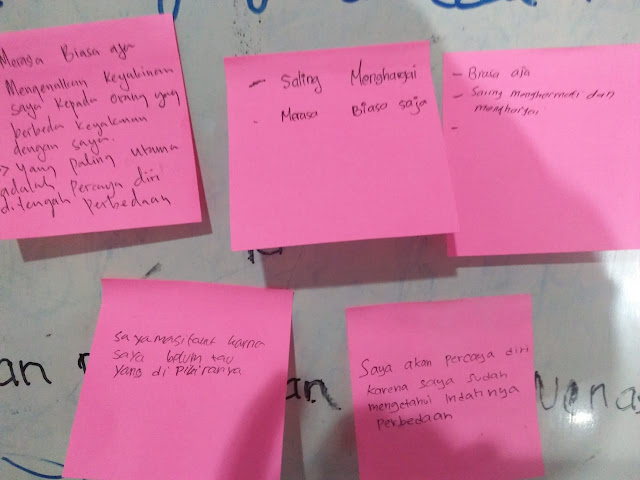All religions teach goodness and respect for others, not only humans but all creations on earth. Although, it should be admitted that there was an action in the name of religion, creating disintegration among society. In addition, Indonesia is actually already final with diversity and plurality. It is proved by the many ethnics, languages and cultures in Indonesia that are one, within the frame of Bhinneka Tunggal Ika (Unity in Diversity)
From the above situation, Yedija Manullang, activist of Multiplication of Stube HEMAT in Bengkulu invited church youths and the surrounding students to know Stube HEMAT and talk about faith differences in the community.
The discussion was held at Yedija Manullang's residence, Jl. Sisingamangaraja, Doloksanggul, Humbang Hasundutan regency, North Sumatra (Wednesday, 29/07/2020). Humbang Hasundutan (Humbahas) is a regency having less friction, conflict and division among religious communities. This regency has just celebrated its 17th anniversary. Especially in Doloksanggul, where Yedija lives, the capital of Humbahas, the majority of Christian community inhabited the area, but in the center of the city there is a mosque, and even many restaurants and businesses owned by Muslims.
Before the activity started, Yedija encouraged all participants to spend about 10 minutes to read some books in order to campaign literacy and reading enthusiasm for youth. Furthermore, Yedija introduced Stube HEMAT dan his experience to be involved in the student service that focuses on mentoring students and youth for about one year. They listened enthusiastically because the name of Stube-HEMAT was unique and they had never heard it before.
In
the discussion process, Yedija distributed paper to each participant and ask
them to write down their impressions and feeling when they meet or interact
with people having different religions. Their answers were surprising because
some were weird, uncomfortable, afraid and insecure. Actually, Yedija also felt
the same thing when he became one of the participants in Multicultural training
and Inter-religious Dialogue at Stube-HEMAT Yogyakarta, with the topic
"Connecting souls, Celebrating differences". Initially, Yedija felt
awkward with the event because he was accustomed to join activities in his
comfort zone, namely with people of one ethnicity and one religion, moreover
the training is an international events.
The analogy of a rainbow and a garden with its beautiful flower and a variety of colors are simple examples to enter the topic of diversity. "Rainbows will be very unattractive and monotonous when consist of one color only. Likewise, a flower garden is decorated with only one type of flower, people will quickly get bored. But it would be very beautiful if the rainbow has diverse colours, and the flower garden will be attractive to man’s eyes when many flowers planted there. So, it would be nice if our society and environment were filled with different people in ethnicity, language or religion,” Yedija said.
But ironically, divisions and conflicts occured because of long-standing differences. These will drain energy and break the diversity of the nation, and disrupt Indonesia's preparation to face the Demographic Bonus and Golden Indonesia 2045. If the society, especially youth, is still debating about differences that lead to conflict and division, then the demographic bonus would be disaster. "The Indonesian youth will later become leaders, system managers, regulators and policy makers in Indonesia. In order to be ready to face challenges and problems, youth must think critically, work creatively, communicate well, and be able to work as a team," he explained.
Cooperation requires unity, the unity is started by accepting all the differences and diversity that exist. Therefore, the existing differences must be transformed into a harmony of life because these differences will continue to exist and remain as long as this nation still exists. Let us stop arguing over differences but campaign unity by respecting-accepting each other, and starting the changes.
Rijon Silaban, one of the participants responded to the topic by telling that in the environment where he studied, outside the Humbahas regency, he still cannot fully accept differences. "The location of my campus is in the middle of a Muslim neighborhood, unfortunately there are still many people in the neighborhood who are reluctant to interact and some even stay away from us, Christian students because we eat pork," Rijon, a 7th-semester-theology student said. "Though differences are common for our society and they beautify the Indonesia like the analogy of flower garden and rainbow, but dialogue forums and the spirit of openness to accept differences must be carried out continuously," he added.
Yedija
then asked what they would feel when they meet people of different religions.
Those who were initially afraid, awkward and insecure, then stated that they
would be normal and enjoy the difference. However, there was one participant
who was still afraid, because so far he had never interacted with people of
different religions. “Since I was in elementary school, junior high school, I
never interacted with non-Christians. All my friends are Christians,” he said
with a flushed face. Therefore, Yedija and the participants will manage a visit
to a mosque in the middle of Doloksanggul town, providing experiences of
interaction with differences. (YDJ)




Comments
Post a Comment